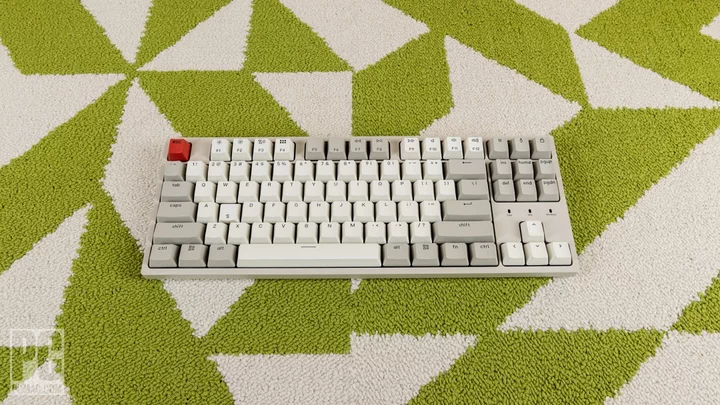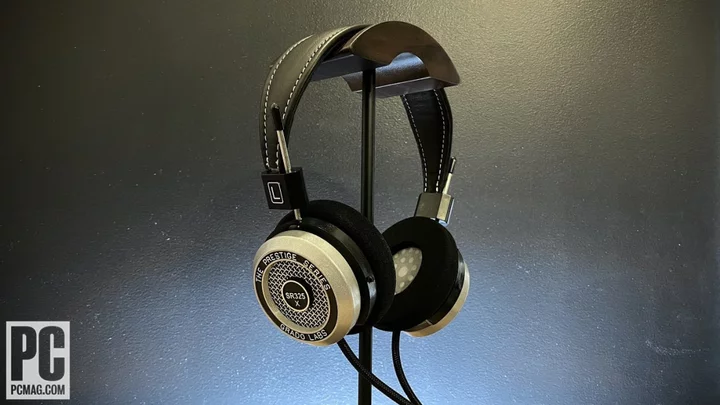At PCMag, we gravitate toward mechanical keyboards, and consider them to be the best option for extended typing on a PC. While they also tend to be more expensive than their membrane-switch alternatives, you can find some exceptions if you hunt hard enough. One is the Keychron C1 ($49), an 87-key mechanical model that doesn’t break the bank and comes in a host of slight variants. The base model we tested is missing the backlighting and other advanced features of more expensive alternatives like the Drop ENTR Mechanical Keyboard, but it's a fine option if you're on the tightest of budgets, and you can add back in some of those missing features if you spring for a slightly upgraded model.
A Retro Take With Modern Sensibilities
The Keychron C1 is a tenkeyless (TKL) design, meaning it lacks the right-side number pad of full-size keyboards. The removal of the number pad means you gain more space for your mouse to swing back and forth across your desk. The C1 measures 1.5 by 14 by 5.1 inches (HWD), with a total weight of 1.5 pounds. It also helps keep the price down; fewer pricey mechanical switches to include.
The base model of the C1 is fairly plain, with no additional bells and whistles aside from a toggle switch to change from a Windows layout to a Mac layout. That said, you can opt for C1 versions for a bit more money if you want to add functions or features. The Keychron website lists other versions with keycap backlighting, either in white or RGB LEDs. There’s also an option for a hot-swappable version (the ability to remove key switches from the PCB without the need to desolder contacts) if you have other key switches you’d like to try in whole or in part.
We tested the base model of the Keychron C1 in a retro-inspired beige color that replicates the look of aged-plastic keyboards of old in a way that manages to be appealing, not stodgy. The keycaps are equally nice, matching the base color with an alternating light beige and gray scheme, with a red Escape key for added flair. The whole aesthetic harkens back to a simpler time, before the gaudiness of modern gaming keyboards. Meanwhile, the backlit models have a more modern-looking black color scheme.
That's not to say that you'll find no modern touches on the base-model C1. For example, a detachable USB Type-C cable plugs in on the top left of the housing, next to a switch to separate the layouts between Mac and Windows. An LED indicator light above the arrow keys lets you know if the keyboard is in Mac or Windows mode, and an additional LED is included for the Caps Lock indicator.
Keychron offers no software to customize the C1, but the layout lacks any extra, nonstandard keys to customize. What is offered is a firmware update utility, but you'd really only need to use it in cases where the keyboard isn’t functioning properly.
Testing the Keychron C1: Getting Back to Basics
In keeping with its customizable mantra, the Keychron C1 comes with your choice of key switches: Gateron Blues, Reds, or Browns. Our test model has Gateron Browns, a tactile kind of pre-lubed switch roughly similar to Cherry MX Browns. The keys were responsive in testing using the web program Monkeytype to track speed and accuracy.
Brown switches have a tactile bump to them that your fingers can feel as you depress each key. The C1 switches bounce back with confidence with each keystroke. In my testing time with the C1, the only moments of inaccurate typing were due to issues with muscle memory (a common issue when going from a full-size keyboard to a TKL model) or dexterity, both trip-ups that can be addressed with more time and practice.
Of note, though, was a significant wiggle in the right-hand Shift key. Normally, key stabilizers are supposed to cut down on this wiggle for a more confident typing experience, but most other keys felt stable, and the wiggle might not bother some people. While the keyboard is mostly plastic, it sits fairly stable on a pair of angled feet with two levels of steepness.
Verdict: Exceeds Budget Keyboard Expectations
You’re limited in your options for keyboards with high-quality switches in the Keychron C1's price range. But at $49, the Keychron C1 does an excellent job of lowering the barrier to entry into the world of spring-action typing. While you won’t get the glitz and glamor of RGB or rotary volume dials, what you will get is a consistent typing experience in a housing with a mature retro aesthetic.
If flashy is what you’re truly searching for, and you have a larger budget to satisfy that desire, consider the Drop ENTR Mechanical Keyboard instead. If you're budget-strapped but dead-set on mechanical quality, however, the Keychron C1 merits its Editor’s Choice nod for extreme-budget mechanical keyboards.









